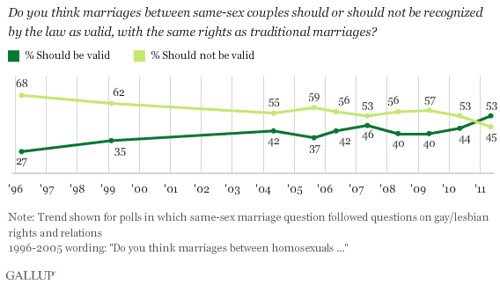
On Sunday at the kick off for John Avalos' campaign for mayor of San Francisco (win John win!), Assemblyman Tom Ammiano greeted me with "Happy Harvey Milk Day!" Indeed, yesterday would have been the murdered gay liberationist's 81st birthday; May 22 is officially observed by the state of California in Milk's honor.
I had to wonder what Milk would have thought of the change in attitudes toward gay people indicated by the Gallup Poll findings charted above. For those -- like Ammiano who was a liberation pioneer himself as a young gay teacher -- like so many of us who were publicly "out" long before it was safe or simple -- the seemingly sudden acceptance that gays and lesbians are just ordinary people who just want to love and live is still a little shocking.
And that our full inclusion in the life of the nation seems to be coming through extending us the right to get married seems particularly incongruous. People who took the risk of coming out back in the day didn't do it to win the right to get married. We stepped out of the closet so that we could experience fully who we already knew ourselves to be. We didn't know whether being our true selves might mean falling off a cliff; we just knew that hiding or pretending to be straight was intolerable. We had never had the option of marriage and weren't mostly even thinking of it; we were busy discovering that it was okay to be gay, lesbian, queer, different and alive!
For the first time in a poll, apparently a national majority of our fellow citizens now think we ought to be able to get married, able to have our relationships recognized by the state. Marriage rights for gay people are coming; the trend seems irreversible. Who'd have thought it?
Being a political person, I have to wonder what this all means to the wider political environment. The internals of the Gallup findings confirm what we've known for awhile: younger people are strongly of allowing gay marriage (70 percent), older people less so. This change is partly generational.
But what is striking is that ALL the gain since 2010 in support for the pro-marriage position seems to have come among Democrats (13 points higher) and independents (10 points higher). Republicans show no change at all in this volatile moment. None.
With this kind of split, gay marriage can be thought of as yet another highly partisan issue between the political parties. All Democrats may not be deeply invested in legalizing gay marriage, but a pro-marriage position is well on the way to being the default stance for Democrats. Similarly, an anti-gay attitude has become a norm for Republicans.
This has consequences that may seem obvious, but I'll spell them out anyway.
- Most gays who participate in politics will continue to vote Democratic. As a community, we've made enough progress toward normalizing ourselves that we might be expected to split along class and race lines, acting on other interests besides our sexual orientation. But as long as the default position for Republicans continues to oppose our full civil rights, broadly we just aren't going to go there in large numbers. Segmenting by class and race is postponed.
- By fighting gay marriage, Republicans further brand themselves as the party of institutionalized intolerance. This is particularly the case among younger voters. For most young citizens, gay marriage is probably not their most vital issue. But supporting gay equality seems an obvious position and without a down side: it's a way to signal tolerance and hope for a better country with no discernible cost. What's not to like about that? Republicans are making themselves stodgy, mean losers to a generation.
No comments:
Post a Comment